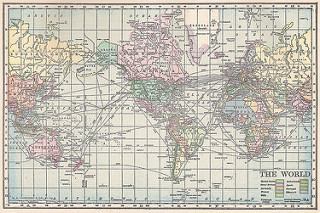How Postcolonial Feminism Changed My Outlook

Image Courtesy of Sue Clark via Flickr
Growing up, I moved countries and schools several times but the board of education I studied under remained the same. All of the countries I lived in, from Kenya to India to the U.A.E, were former colonies that still followed the British education system rigorously.
Even though colonization is fortunately a historic relic, its effects continue to linger in former colonies. I thought knowledge of colonial history granted immunity from being affected by it but I soon realized that I was also a product of my imperialist education. While colonization is easily identifiable as seizure of a territory by a colonial power, imperialism manifests in insidious ways. In education, it manifests through an emphasis on the purity of language and grammar, and a prioritization of Anglo-American histories over local histories.
I was never certain why I struggled to adapt to casual lingo and slang. When I entered UCLA I realized it was one of the many pervasive effects of my British education.
I also struggled (and continue to struggle) to adapt to the American style of writing. Unlike its British counterpart, the American style of writing favors lucidity and clarity over convolution.
More than writing, I struggled with the differences in enunciation.
America is described as a “melting pot”. I found the phrase “melting pot” extremely paradoxical—it boasted of welcoming diversity, yet forced homogeneity. For me, adapting to the American “melting pot” way of life by remedying my habits was easy. Attempting to change my writing style was a conscious effort to not sound “stuffy” but the changes in enunciation were in response to my friends’ correcting my pronunciation of words like “vegetable” and “can’t.”
Taking a class on postcolonial literature this quarter made me aware of the insularity my education had bred. Thanks to my imperialist education, I had grown up reading primarily British authors. The only non-British text I had read was Edward Albee’s “Who’s Afraid of Virginia Woolf,” which I savored in the same way that a man wandering through a desert savors his first sip of water.
My class introduced me to postcolonial feminism. Postcolonial feminism describes a feminist movement that opposes the binary structure of Western feminism and makes space for intersectional thoughts and ideas. Postcolonial feminism also evaluates the socio-economic and political impact of colonialism following the official end of colonial rule, with a focus on gender politics. An example of this in contemporary times is the hijab: viewed by Western women as a sign of oppression, it often symbolizes stature to Muslim women. Postcolonial feminism also questions knowledge structures and attempts to view history from the perspective of a marginalized group, rather than a central power. An example of this would be the critique of the new model of globalization which re-enacts colonization, only the imperial power is determined on the basis of economic power. Countries which are economic leaders exert a lot of influence on the economically impoverished countries, thus perpetuating a new form of imperialism.
Despite belonging to a culture that is not served by Western feminism, my ideas of feminism have been shaped by Western feminism. I grew up viewing the garments of my culture such as the sari as oppressive, not realizing that they can be someone else’s expression of identity and freedom. (To clarify, Indian society continues to practice traditions and customs that are patriarchal, but garments aren’t symbolic of that.)
My high school senior year reading was filled with the troubling trope of killing adulterous women. The men on the other hand were pardoned for infidelity. Compare Emily Brontë’s Wuthering Heights, wherein Catherine Earnshaw’s infidelity to her husband is punished with death, to Charlotte Brontë’s Jane Eyre, wherein Mr. Rochester’s infidelity is not only justified but ultimately forgiven.
Thus reading Sandra Cisneros’ Woman Hollering Creek in class was truly cathartic. Cisneros explored the tricky dynamic of infidelity in various short stories, not only giving women the voice they had been denied but also attempting to give them agency in a landscape that traditionally hindered it. For instance, in Never Marry a Mexican, a story that explains a woman’s decision to reject the norm of marriage, Clemency, the protagonist, takes credit for creating her lover, Drew, from her chosen paints, thus exerting her authority over him and his destiny.
Moreover, Anglo-American education stressed the importance of proper writing. A story had to follow the Freytag’s Pyramid of writing of sequentiality and structure. Cisneros’ writing style defied these ideals: her storytelling style was often fragmentary and blended Mexican slang with English seamlessly. She created a space for her culture in a language that was geared to deny such liberty, and ultimately taught me to do the same.
My introduction to postcolonial feminism was a godsend, for it pointed out the gaps in my feminist ideals and taught me that I still have a lot to learn.




